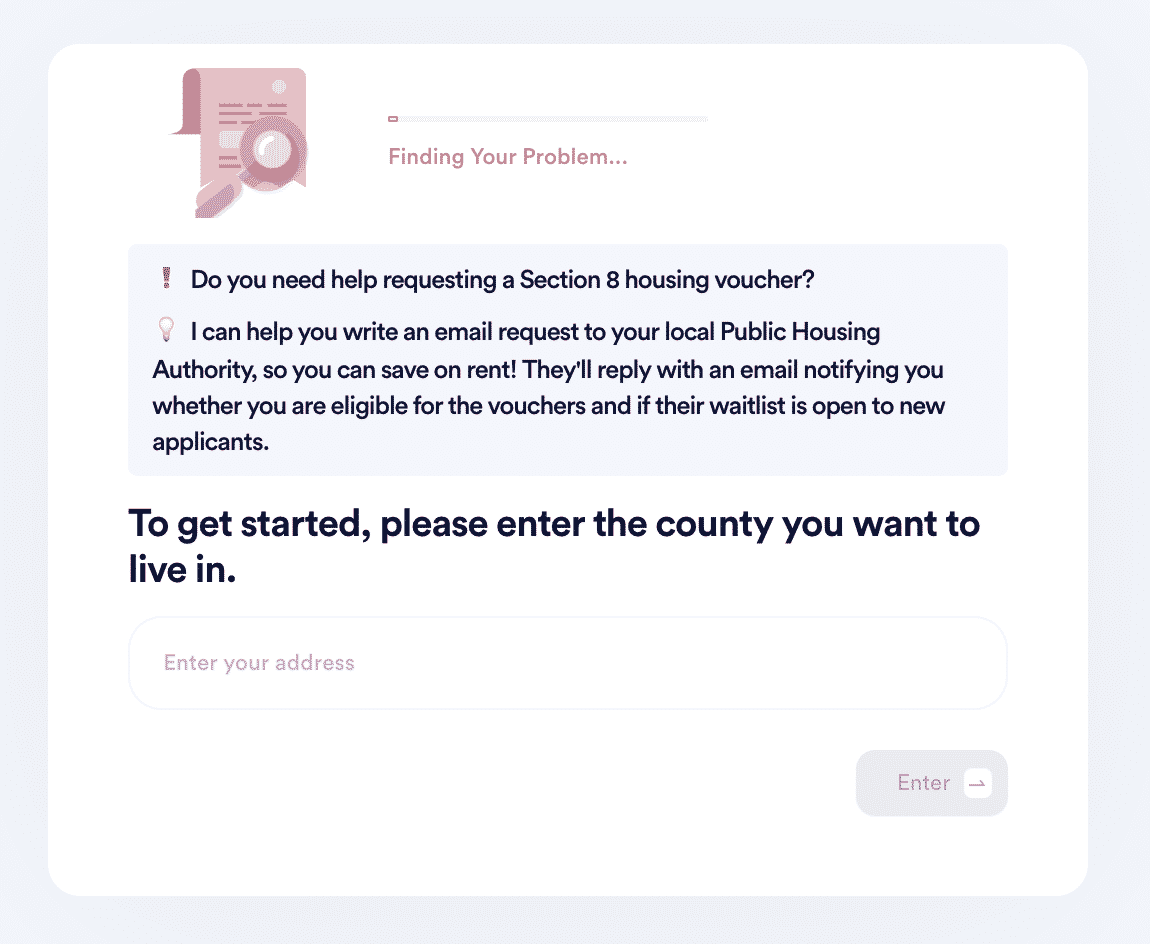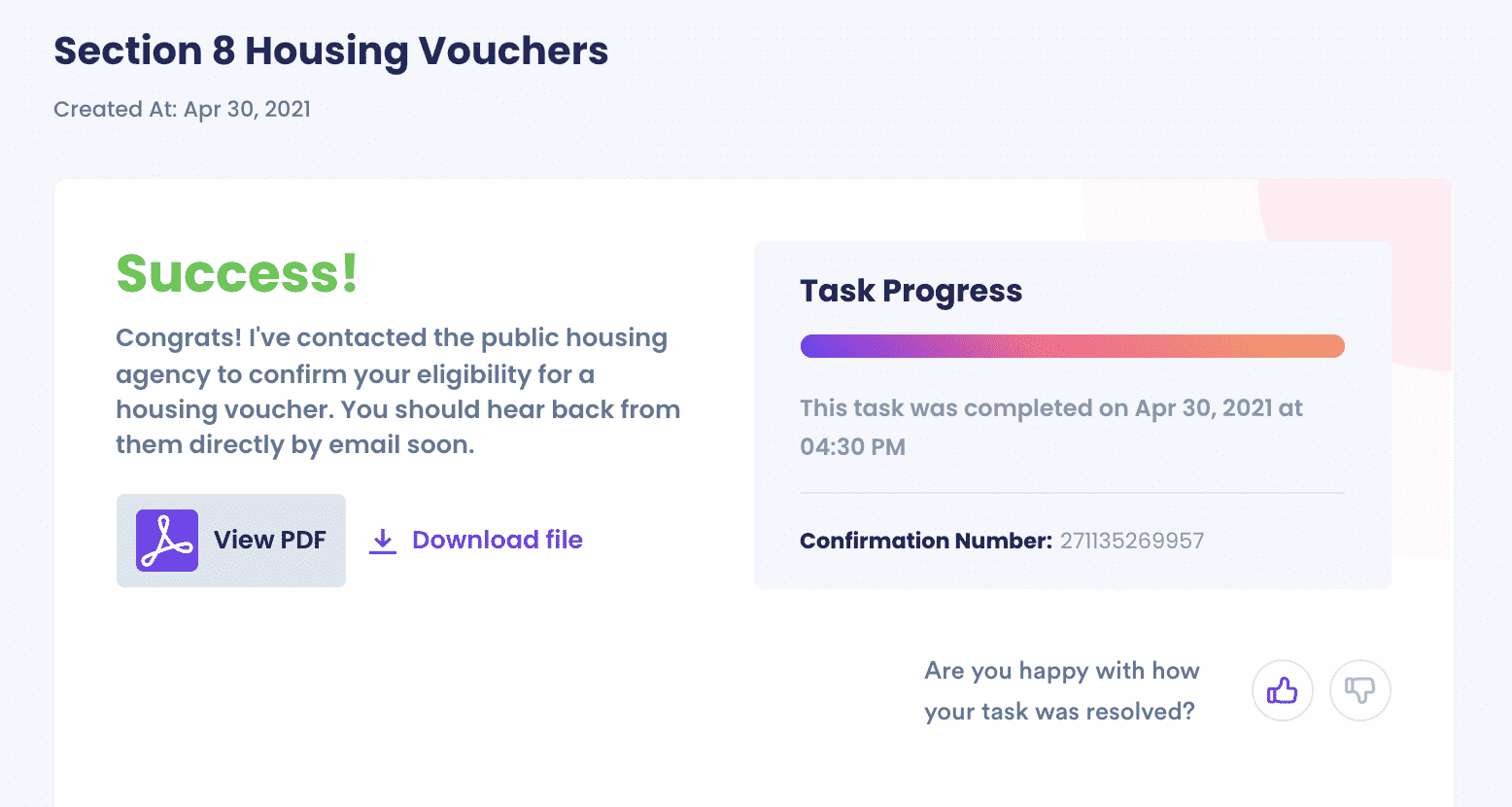Who Can Live With You On Section 8 Vouchers?
Section 8 housing vouchers offer substantial rental assistance to individuals and families in need. To be awarded the Section 8 voucher, you need to meet the eligibility criteria, including the family definition, according to the United States Department of Housing and Urban Development.
Sometimes, the rules are not clear or straightforward, which confuses whether you can house certain people or not. DoNotPay clarifies these rules by offering quality, and fast application for Section 8 housing. Sign up on our website and enjoy these services hassle-free.
Who Is Eligible for Section 8 Housing?
Section 8 is dedicated to bringing safe and affordable housing to low-income families and individuals across the U.S. The Housing Choice Voucher Program covers up to 70% of the beneficiaries' rent and utility bills every month.
The eligibility criteria are mostly uniform across all states. There is, however, room for individual local housing agencies to tweak the rules to accommodate their regular clients.
The most basic eligibility criteria are that the applicant must be 18 years or older and be an American citizen or certified immigrant.
Below are the additional eligibility measures:
You Must Meet the HUD’s Definition of a Family
The HUD's definition of a family is people who all or any meet the following guidelines:
- A group of people living together with at least one individual is over the age of 62
- One or more people living together, with or without a child
- A household where one or more individuals have a disability
- A household who has been due to government action or due to property destruction caused by a natural disaster or other federally recognized disasters
- A tenant left alone in a unit after all other family members (who were benefiting from Section 8) left the unit
- A single needy person who does not meet any of the above criteria
Minimum Income Cutoff
The Section 8 housing program is for low-income individuals and families. HUD has set the minimum income into three different categories:
| Extremely Low Income | 30% of the area's median income level |
| Very Low Income | 50% of the area's median income level |
| Low Income | 80% of the area's median income level |
The income is calculated as the sum of all household members' income, subtracting the valid deductions. Households with meager incomes are prioritized in Section 8 voucher allocation.
Citizenship Status
Section 8 housing vouchers are only given to U.S. citizens and eligible immigrants. The citizenship eligibility guidelines are broken down in Exhibit 5-1 of HUD's Housing Choice Voucher Guidebook.
Families who are a mix of U.S. citizens and eligible immigrants will receive housing vouchers, with the amount depending on the percentage of family members who qualify for housing assistance.
Eviction History
Section 8 housing vouchers are not given to individuals who have been evicted within the last three years due to:
- Drug and substance abuse
- Alcohol dependency
- Methamphetamine production
And more restrictions might apply in your region.
What Are Section 8 Family Obligations?
Section 8 housing is based on transparency and giving truthful information to your local PHA. HUD has set a couple of rules and regulations that tenants need to follow to continue benefiting from Section 8 housing. The tenants are obliged to
- Pay their share of rent and utility bills on time
- Pay their security deposit
- Report any change in family status to your Local PHA
- Report any changes in income to the local PHA
- Follow the terms of your lease or tenancy agreement
- Do not host guests for more than 14 consecutive days
- Avoid all illegal activities
- Allow PHA inspection
- Request approval of new roommates
- All listed household members must reside in the rental unit registered with HUD and PHA
Who Can Live With Me in Section 8 Housing?
You can live with anybody who fits in the HUD's description of a family and anyone listed by your local housing authorities as part of your household. Guests can only live with you for a maximum of 14 days.
If anyone wishes to move in with you, you must report the addition to your local public housing authority to have them listed as part of the household. Your Section 8 agreement will be reviewed after the household addition. Depending on the review results, you might keep or lose the Section 8 housing voucher.
Can My Boyfriend Live With Me in Section 8 Housing?
Yes, your boyfriend can live with you on a Section 8 housing voucher. However, for your boyfriend to benefit from Section 8 housing and be counted as part of your household, he must be listed as a resident in your home.
HUD guidelines state that you can only host a guest in your Section 8 housing for 14 days. If the visitation goes beyond 14 days, you will be violating your Section 8 agreement, which can lead to the cancelation of your voucher.
If guests exceed the allowed 14 visitation days, they should move out or be listed as part of the household. To be listed as part of the household means that the Section 8 agreement will have to be reviewed. The new household members' income must be included as part of the household income.
If you get married while living in Section 8 housing, you need to update your household information with your local PHA. Your Section 8 agreement and eligibility will be reviewed.
Learn About Section 8 Family Obligations With DoNotPay
The section Section 8 rules and family obligations might be confusing to follow through. You also need to periodically update your information with the local PHA to maintain your housing voucher status. DoNotPay brings you simplified information on Section 8 and helps you apply for Section 8 fast, easy, and with no hurdles.
Sign up on our website and utilize our Rental Assistance product.
How to Apply for Section 8 Housing With DoNotPay
If you want to apply for Section 8 Housing in any state or county but don't know where to start, DoNotPay has you covered in 2 easy steps:
- Answer a few questions about your income, family size, veteran/disability status, which county you hope to live in, etc.

- DoNotPay will find the PHA in charge of that county and contact them with all of your eligibility information to determine if you can start applying. They'll get back to you directly via email with the next steps.

What Else Can DoNotPay Offer?
DoNotPay is the fastest, most efficient, and most convenient way to find and apply for Section 8 housing. We facilitate the most tedious services by working with government entities and private companies to bring benefits to your fingertips.
Sign up on our website to enjoy the following services and more:
- Claim your warranty
- Request for a sick leave
- Get a tourist visa guide
- Send Demand Letters To for stalking and harassment
- Search for sex offenders in your area
DoNotPay can make your life easier in just a few clicks. All you have to do is sign up!


